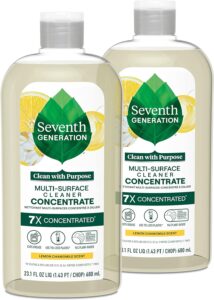Keeping your kitchen clean is important for both hygiene and aesthetics. However, many common cleaning products contain harsh chemicals that can negatively impact your health and the environment. The good news is, you can get your kitchen sparkling clean without exposing yourself or your family to toxic chemicals. In this article, we’ll explore some of the best natural, non-toxic ways to clean every part of your kitchen.
Why Chemical Cleaners Are a Concern
Conventional cleaning products often contain ingredients like ammonia, chlorine, formaldehyde, and artificial fragrances. Exposing yourself to these chemicals day after day can irritate your eyes, skin, and respiratory system. The fumes from chemical cleaners can also aggravate asthma and allergies. Young children are especially vulnerable.
Additionally, when we wash chemical cleaners down the drain, they make their way into lakes, rivers, and oceans where they can harm wildlife. That’s why switching to non-toxic cleaners is important for both human and environmental health. The good news is, you can get a sparkling clean kitchen without any of the risks by using natural cleaning methods.
Effective Natural Cleaning Solutions
Fortunately, you can make highly effective non-toxic cleaners right in your kitchen using common household ingredients. Here are some of the best natural solutions for cleaning every area of your kitchen:
Countertops
- Baking soda – Sprinkle baking soda onto a damp sponge or cloth and scrub to remove stains and disinfect. Rinse thoroughly. The light abrasiveness lifts dirt without scratching.
- White vinegar – Mix equal parts vinegar and water in a spray bottle. Spritz onto countertops and wipe clean for a streak-free shine.
Appliances
- Castile soap – Look for unscented, plant-based liquid soap. Dilute a few tablespoons in water for an all-purpose appliance cleaner.
- Club soda – Remove grease and cooked-on food easily by pouring club soda onto stovetops and ovens. Let bubble a few minutes before wiping clean.
Sinks
- Lemon juice – Remove stains and sanitize metal sinks by rubbing half a lemon over the surface. Rinse and let air dry for sparkling shine.
- Baking soda – Sprinkle baking soda onto a damp sponge and scrub your sink to eliminate odors and soften water deposits.
Kitchenware
- Salt – Make pans, pots, and stainless steel shine by sprinkling salt and rubbing gently with half a lemon. Rinse thoroughly.
- Olive oil – Apply a small amount of olive oil to a soft cloth. Buff onto utensils and stainless appliances. Wipe away any excess oil residue.
Floors
- White vinegar – Add 1 cup vinegar to a bucket of water. Mop onto tile, wood, and vinyl floors for a clean, streak-free finish.
- Castile soap – Just a few drops of liquid castile soap in water makes a natural floor cleaner safe for vinyl, tile, and sealed hardwood.
Glass
- Cornstarch and vinegar – Mix 2 tablespoons cornstarch into 1 cup vinegar. Apply onto glass surfaces and wipe away film and streaks.
- Newspapers – Dip a piece of newspaper into vinegar and water. Use to get windows and mirrors spotless without chemical cleaners.
Other Helpful Tips
- Look for plant-based sponges instead of traditional plastic sponges, which harbor bacteria. Replace frequently.
- Microfiber cloths lift and trap dirt without the need for chemical cleaners. They’re also reusable.
- Open windows or use fans while cleaning to air out chemical fumes from typical cleaners.
- Store natural cleaning ingredients like vinegar, baking soda, lemons, and castile soap under your sink so they’re on hand when you need them.
The Bottom Line
You don’t need toxic chemical cleaners to get every inch of your kitchen clean and germ-free. With natural solutions made from simple ingredients like vinegar, baking soda, and castile soap, you can easily remove dirt, grease, and stains from surfaces. Using these non-toxic cleaning methods is safer for you, your family, and the environment.
Hey there! We hope you love our fitness programs and the products we recommend. Just so you know, Symku Blog is reader-supported. When you buy through links on our site, we may earn an affiliate commission at no extra cost to you. It helps us keep the lights on. Thanks.
Disclaimer: The information provided in this discussion is for general informational and educational purposes only. It is not intended as medical or professional advice. Only a qualified health professional can determine what practices are suitable for your individual needs and abilities.

